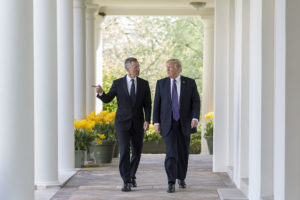
President Donald Trump walks with NATO Secretary General Jens Stolenberg, Wednesday, April 12, 2017, along the Colonnade outside the Oval Office of the White House in Washington, D.C. (Official White House Photo by Shealah Craighead)
At The American Spectator, Brandon Weichert hammers Dick Cheney and the neocons for what he calls “the most wasteful, strategic mistake the United States has ever engaged in.” Weichert says the overreaction of Cheney’s “one-percent doctrine,” was terrible for America. Weichert praises President Trump for trying to course-correct away from the “neurotic fear of the outside world that the former vice president possessed.” He writes (abridged):
When former Vice President Dick Cheney was being whisked from his office downstairs to the underground Presidential Emergency Operations Command (PEOC) bunker on 9/11, his view on foreign policy likely changed. Having served for years in and out of government, Cheney was a hawk, but he was not necessarily a proponent of neoconservatism — what I like to call “democratic globalism.”
Cheney was more in line with the realist school of thought (though there were some differences of opinion). He began his political career in the Nixon Administration, the home of realism. Cheney did engage in several bureaucratic knife fights with Dr. Henry Kissinger, the grand pooh-bah of realism at the time, who came to serve as the national security adviser and secretary of state in both the Nixon and Ford Administrations.
Ultimately, though, Cheney embraced the strong but restrained approach of realists.
On that day, the formulations of Cheney’s infamous “one-percent doctrine” came about.
The one-percent doctrine went like this: If there was even a one-percent chance that a terrorist or other American enemy could pull off another 9/11 — or worse — the United States had to commit 100 percent of its time, capabilities, and efforts to thwarting that one-percent threat, no matter the cost.
According to this view, despite the existence of a massive, entrenched defense and intelligence bureaucracy, the United States missed the warning signs of 9/11.
Cheney worried about what else America’s elite institutions could be missing. The one-percent doctrine was Cheney’s best solution for ensuring another devastating attack did not surprise the United States.
What followed was the most wasteful, strategic mistake the United States has ever engaged in. All because America’s leaders chose to overreact after having spent years ignoring asymmetrical threats, such as al Qaeda
The Middle East is likely permanently destabilized due to America’s reckless endeavor in Iraq.
Cheney’s irrational and fear-based doctrine lives on today in Washington, D.C. Everything that happens overseas — particularly in the Middle East — is framed as an existential crisis. The antidote to these crises is always the same: greater levels of American military involvement.
Despite their loathing for Dick Cheney, most of America’s foreign policy elite — regardless of political party — are gripped by the same neurotic fear of the outside world that the former vice president possessed.
It is the much-maligned President Donald Trump who is attempting to shake the foreign policy establishment from its anxiety and return U.S. foreign policy to a more rational, responsible, and restrained place.
Giving into fear is not what statesmen do.
It’s ironic that the brash, non-politician, real estate mogul from New York has a more statesmanlike foreign policy than the professional politicos who have run U.S. foreign policy for decades.
Read more here.
If you’re willing to fight for Main Street America, click here to sign up for my free weekly email.





